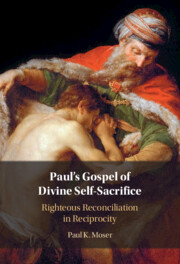Book contents
- Paul’s Gospel of Divine Self-Sacrifice
- Paul’s Gospel of Divine Self-Sacrifice
- Copyright page
- Epigraph
- Contents
- Preface
- 1 Gospel of Righteous Self-Sacrifice
- 2 Faith Grounded in Self-Sacrifice
- 3 Incarnational Ethics of Self-Sacrifice
- 4 Hope and Fear toward Divine Self-Sacrifice
- 5 Responsible Agency toward Divine Self-Sacrifice
- 6 Assessing God’s Gambit in Self-Sacrifice
- Select Bibliography
- Index
6 - Assessing God’s Gambit in Self-Sacrifice
Published online by Cambridge University Press: 08 September 2022
- Paul’s Gospel of Divine Self-Sacrifice
- Paul’s Gospel of Divine Self-Sacrifice
- Copyright page
- Epigraph
- Contents
- Preface
- 1 Gospel of Righteous Self-Sacrifice
- 2 Faith Grounded in Self-Sacrifice
- 3 Incarnational Ethics of Self-Sacrifice
- 4 Hope and Fear toward Divine Self-Sacrifice
- 5 Responsible Agency toward Divine Self-Sacrifice
- 6 Assessing God’s Gambit in Self-Sacrifice
- Select Bibliography
- Index
Summary
This chapter acknowledges that Paul’s gospel of divine self-sacrifice may seem too good to be true, even a fairy tale, to some people. We need a reality check for it, and Paul’s injunction to “test everything,” including ourselves (2 Cor. 13:5), lends support to this cause. This chapter identifies Paul’s approach to the needed testing, and thereby clarifies the foundations of his perspective on human knowledge of God. Paul’s message of divine self-sacrifice rests on resources needed to commend that message as not just helpful but also true. According to this chapter, Paul’s message of self-sacrifice in Romans 12:1–2 itself holds the key to suitable assessment of his good news. A key consideration is that suitably apprehending divine righteousness in self-sacrifice will confirm God’s reality and redemptive will. Such apprehending enables one to experience firsthand the divine self-sacrifice in one’s own life, with its distinctive power to obey God. There is no circularity here, because the relevant experience is not the same as a message of divine self-sacrifice, but it can be a truth indicator, and thus evidence, for such a message. The chapter explains why Paul does not rely on arguments of natural theology.
Keywords
- Type
- Chapter
- Information
- Paul's Gospel of Divine Self-SacrificeRighteous Reconciliation in Reciprocity, pp. 184 - 229Publisher: Cambridge University PressPrint publication year: 2022

